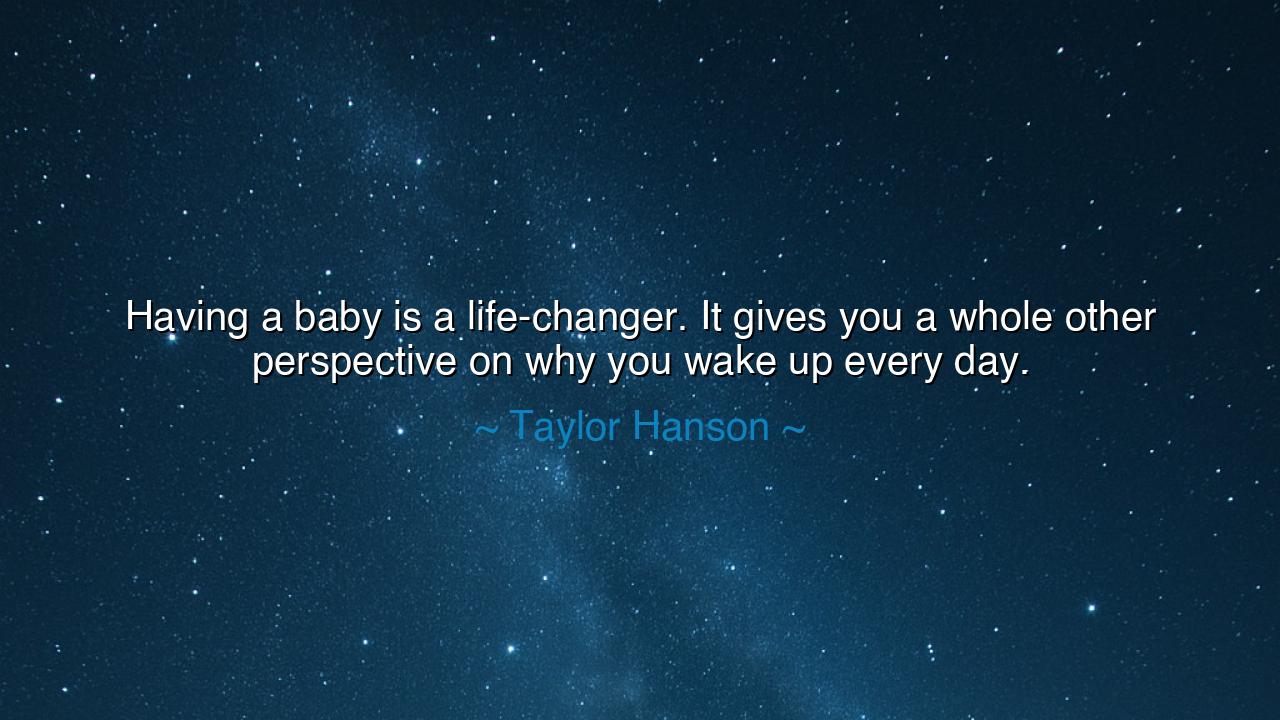
Having a baby is a life-changer. It gives you a whole other
Having a baby is a life-changer. It gives you a whole other perspective on why you wake up every day.






In the words of Taylor Hanson, there lies a truth as old as humanity itself: “Having a baby is a life-changer. It gives you a whole other perspective on why you wake up every day.” Though he speaks from his own experience, his words echo the voices of countless parents throughout history. For the arrival of a child does not merely add another person to the world—it transforms the heart, reshapes the mind, and reorders the soul’s very purpose.
The meaning of this truth rests in the idea of perspective. Before the child, life may be lived for ambition, for pleasure, for survival, or for the fulfillment of one’s own desires. But when the baby arrives, a new horizon appears. Suddenly, every choice, every effort, every dawn carries the weight of responsibility and the sweetness of love. The parent no longer asks only, “What do I want from this day?” but rather, “What must I do to ensure the good of the one entrusted to me?” Thus, the child becomes not only the object of care but the compass of purpose.
The ancients knew this sacred shift well. In the writings of Cicero, we read that the continuation of the family through children was the highest form of duty, binding the parent to both past and future generations. In the Scriptures, Hannah dedicates her long-awaited son Samuel to God’s service, knowing that her life’s meaning has forever changed in his birth. And in the chronicles of kings, many rulers are remembered not for their conquests but for the heirs they raised to carry their name. To bring forth a child was not simply to alter daily routines, but to step into the eternal stream of legacy and responsibility.
Consider the story of Nelson Mandela, who while imprisoned for decades was separated from his children during their youth. In his letters, he often wrote not of politics or power, but of his longing to guide them, to shape their lives with wisdom and love. His greatest sorrow was not the chains around his wrists but the distance from his children. For he knew, as Hanson reminds us, that waking up every day carries new meaning when one has young lives depending upon you.
Yet this transformation is not only heavy with responsibility—it is also filled with joy. The laughter of a child, the small hands reaching out, the first steps taken—these moments ignite a fire in the heart that no wealth or fame can equal. The baby does not only demand; the baby gives. The parent finds new strength, new resilience, and a new capacity for love precisely because they rise each morning with someone else’s life as their guiding star.
The lesson for us is clear: if life feels hollow, seek purpose beyond yourself. A child is one of the most profound ways this purpose is revealed, but the principle is larger still. To awaken with love for another—whether a child, a family member, or even a cause greater than oneself—is to rise with meaning. It is to see that life’s truest joy is not in consumption, but in service, in giving, in shaping the future through daily acts of devotion.
Practical wisdom flows from this. For those with children, remember that each morning you rise not only for your own survival but for the flourishing of a soul entrusted to your care. For those without children, seek ways to live with the same spirit—through mentorship, teaching, service, or care for those who cannot care for themselves. The essence of Hanson’s words is not about biology alone, but about discovering the higher perspective that love and responsibility awaken.
Thus, in the voice of Taylor Hanson, we are reminded that life changes most profoundly when it ceases to be lived for oneself alone. The cry of the baby in the night is more than a call to duty—it is a call to purpose. And when we answer that call with love, each dawn ceases to be ordinary, and every day becomes sacred.






AAdministratorAdministrator
Welcome, honored guests. Please leave a comment, we will respond soon